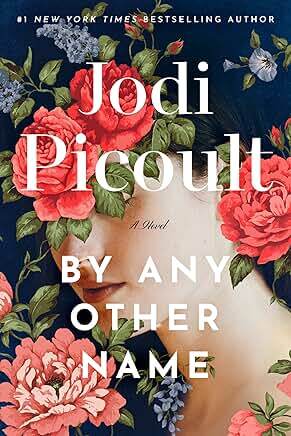Sunday Review: By Any Other Name by Jodi Picoult

Many years ago, my book club read My Sister’s Keeper by Jodi Picoult. I was so outraged by the ending that I threw the book across the room and swore I would never read another book by her. And I’ve held to that resolution for nearly twenty years. So imagine my surprise when a good friend who had the same reaction to the same novel—and who faithfully attends the Shakespeare festival in Stratford, Ontario, every year—asked me to read By Any Other Name.
This is a novel about the difficulties women have in the world of theatre, both in Shakespeare’s day and in ours. It is a dual timeline story. The present-day story features Melina Green, a young woman whose earlier plays have been rejected as “too emotional.” Now she has written a work about her ancestor, the little-known Renaissance writer Emilia Bassano, but she’s too afraid of rejection to submit it to an important festival. So her best friend does it for her, under the masculine-sounding pseudonym Mel Green.
The other timeline, of course, features Emilia Bassano herself, who was a real historical figure. Bassano comes from family of Italian musicians who play at the court of Elizabeth I, but she is an orphan and a female, two disadvantages that make supporting herself by any profession—except the obvious one—an unlikely proposition. When she reaches the age of 13, her family arranges for her to be the courtesan of a much older and powerful man, the Lord Chamberlain who must approve all plays before they are produced. As is typical of such relationships, it doesn’t last. Trapped (once again by her family) in a miserable marriage to a man who wastes her dowry and abuses her, she must use her wits to survive.
Picoult has embedded within her novel an unusual theory about Shakespeare’s authorship. She proposes that Bassano wrote some of his plays, particularly those that feature strong women characters or details about court life and foreign places the man from Stratford would be unlikely to know. Picoult also tackles the broader question of whether Shakespeare wrote any of the works attributed to him, but I will leave that theory for readers of the novel to discover for themselves.
I really enjoyed this book and recommend it. I found both main characters engaging and wanted both to succeed. This is a first effort at historical fiction by Picoult, I believe, and I found the Renaissance details as vivid and concrete as the contemporary ones. The theory about Shakespeare’s authorship intrigued me. Although I wouldn’t go so far as to say I buy it completely, it has given me much to think about. I’m looking forward to a lively discussion during my next dinner with my Shakespeare-loving friend.



